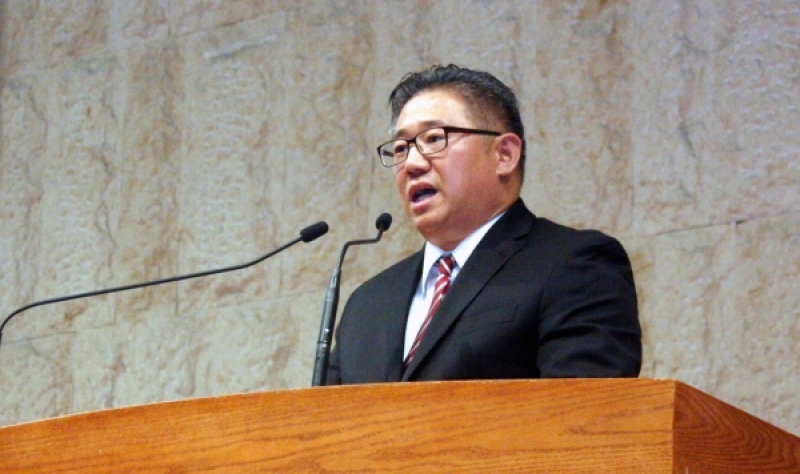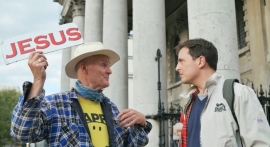
"I prayed every day that I would be able to return home. But one year passed, and God did not answer my prayer. Then I started wondering, 'Does God want me to remain here?' And in the letter that I received from my mother, she said, 'I think this is the time you need faith like Daniel's.' A faith that can say, 'Even if he does not.'"
Then he prayed, "Now let not my will be done, but yours. I want to be used by you." And after that, everything changed. The prison guards who were keeping watch over him were no longer his 'oppressors,' but 'lost sheep' to whom he needed to share God's love. That allowed him to begin conversations with the guards, and one by one, they started to open up.
This is the testimony of Kenneth Bae, a Korean American missionary who was detained after visiting North Korea in November of 2012 and was released two years later. Bae shared his experiences while being detained and the need to pray for North Korea at a reunification prayer meeting at Seoul Myungsung Presbyterian Church on May 30.
Prior to his detainment, Bae had visited North Korea often and had been a part of a group called 'Gideon's 300 soldiers' out of a desire that the world would pray for North Korea. He had a conviction that change would come one day sooner if he could pray inside of North Korea. Then, a mistake led to the exposure of his identity to the North Korean government, and ultimately, to his detainment.
"At first, I was filled with worry, anxiety, and guilt," shared Bae. "But I was able to find peace again. It was out of the faith that God will protect me and that he will never leave me."
"After that, I just told them the truth about everything. Who I am, and why I came to that country. They didn't believe, but the voice of God saying, 'The prayer of one person can change a nation,' continued to ring louder inside of me," Bae said.
Bae received a 15-year sentence to labor on charges of attempting to subvert the government. He had to endure harsh labor from morning to night. And he was taken to the hospital due to malnutrition. The one thing that helped him to endure, Bae said, was the Lord. He said it was then that he was able to deeply realize the meaning of the oft-said confession, "Jesus is the only hope."
"The prison guards' evaluation of me would often go something like, 'hardworking and faithful.' It's because I would not be lazy in my work even when they didn't supervise me, and that's because I had this sincere desire that these people who have never even heard the name of Jesus would be able to see at least a shadow of who he is," he said. "I held on to my identity. I would remind myself, 'They may think of me as a criminal, but I'm here to be a light, to shine Christ's love.'"
It wasn't just the labor that made things difficult for Bae. According to him, North Korean officials would come everyday and tell him, "No one remembers you. You won't be able to return home." Bae was told this even two days before he would be released. He recalled that he had to wrestle every day to believe in God's voice, telling him, "I will not forget you."
"One day, a North Korean asked me, 'Is God really alive?' And I said, 'Yes, he is.' And he asked, 'Then why are you still here?' I responded, 'Maybe God has a different plan. It might be because of you. To tell you about God.'"
Bae was released in November of 2014. And he is praying even more for North Korea now than he had been before. One realization that came deeply to him during his time of detainment was that God has never forgotten him, and never will forget him, at any moment. And because of that, Bae said, he does not want to forget North Korea. And he urges the many people that he meets to remember and pray for North Korea.
"For me, it was only two years, but for them, they may have to live their whole lives trapped in that place, never knowing God," Bae said. "Please pray for them. What they need more than physical or material help is your sincerity. We must love them first, just as Christ loved us first. Please do not forget. Do not forget them, and do not forget the missionaries who are detained there while trying to share Christ."
And before he ended his testimony, he left the audience with a question that one of the prison guards asked him.
"We're the guards, and you're the criminal, but why do you look happier?"
This article has been translated. For the original in Korean, visit kr.christianitydaily.com.

















